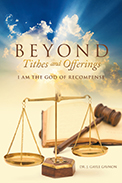
 |
Gaymon’s work records a multitude of examples of, and the reasons for, tithes and gifts presented under Mosaic law. The text is written partially as a history of traditions and interpretations of religious practices using many versions of the Bible and other sacred texts as references. According to some examples in the book, tithes were fixed by religious leaders through divine instruction to demonstrate the worship of God, as well as to provide sustenance to people in need and those whose vocations or life situations precluded their growing or raising food. In addition to providing historical examples of tithing throughout millennia and the reasons for them, the author challenges the reader to accept an active faith and to seek that which God truly wants of us beyond nominal religion: an offering of ourselves.
In addition to the historical and biblical research, Gaymon offers examples of "what ... it takes to be a true Christian." Genuine love, care, and generosity are key, as the reader is reminded of Jesus' sacrifice of his life for humanity. The author’s book clearly promotes the Christian message. Gaymon is a "doctor of ministry in congregational ministry," and his book is meant to increase the reader's knowledge of aspects of the faith as well as to help the person serve God. In his work, the author offers up a well-researched thesis, as well as a sermon based on scholarship, devotion, personal reflections, and memories of the author's life. Above all, Gaymon provides readers with the background and core reasons behind one of the faith’s most important and recognizable practices.